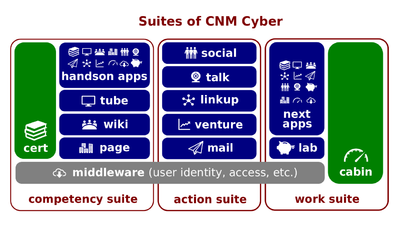CNMCyber Appware
CNM Cyber Appware (hereinafter, the Lectio) is the lesson part of the CNM App Essentials lesson that introduces its participants to CNM apps. This lesson belongs to the Introduction to CNM Cloud session of EmployableU Foundation.
Content
The predecessor lectio is How Apps Are Built.
Script
- Any CNM app becomes an end-user application when its software is installed on one of CNM Farms. The name of software starts with the name of the CNM app that belongs to CNM EndUser Apps that is followed by the ending
-ware. For instance, CNM MediaWiki powers CNM Wiki, CNM Tubeware powers CNM Tube, CNM Mailware powers CNM Mail, etc.
- All the software is stored in the software repository of CNM Lab. HandsOnLab and LabNext also have copies of that repository.
- CNM Cloud utilizes the software using three deployment models.
- The first model is traditional. The computing servers provide these apps with the operating system, database, support of programming languages, and web servers.
- In another model, CNM apps are executed as software containers. Besides the apps, these containers include operating systems, so the containers don't rely on the one of the computing server. Container engines of the CNM Farms provision the containers with everything they need to operate.
- Initially, all CNM apps based on the computing servers, but the number of containers is constantly growing. Eventually, those apps that rely on the servers for their computing functions will completely move to CNM Cloud Next.
- A new deployment model is being tested on the Cloud Next. It is called serverless. Some part of this experimental cloud would be provisioned in the way that the new apps will not need to rely on any server at all.
Key terms
- CNM Cabinware, CNM Moodle, CNM GitLab, CNM Linkupware, CNM Mailware, CNM HumHub, CNM Jitsi, CNM Tubeware, CNM MediaWiki, software container, serverless
Closing
- Is the concept of software containers explained well? (Yes/No/I'm not sure)
CNM Cloud Online is the successor lectio.
